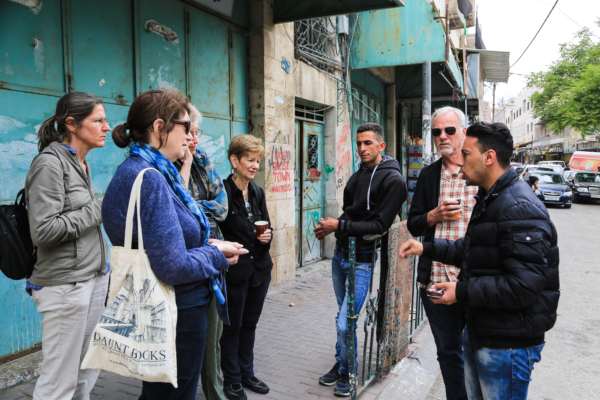EPF PIN Says ‘Go and See’ To Encourage Holy Land PilgrimagesPosted Jan 22, 2021 |

During a visit to Hebron, EPF PIN pilgrims learn about the situation there from a member of Youth Against Settlements, a non-profit organization.
The mission of the Episcopal Peace Fellowship Network Palestine Israel Network (EPF PIN) is to “establish a network dedicated to a more robust Episcopal Church witness for justice and peace for our Palestinian and Israeli brothers and sisters.” We can think of few more effective ways to witness than to Go and See, and that is why EPF PIN has launched travel resources available on its website for Holy Land travelers and pilgrims.
EPF PIN is lifting up the concept of pilgrimage in speaking to travelers, understanding like poet Mark Nepo that “One who journeys and is transformed by that journey is a pilgrim.” It is that transformation that EPF PIN has emphasized in its offerings and believes it is uniquely accomplished in a Holy Land pilgrimage by seeking and engaging the often troubled and difficult circumstances present there today, not avoiding them.
The extraordinary transformative power of the Holy Land – Palestine and Israel today – is in the challenges and struggles, as well as the sublime. We believe the authenticity of a Holy Land pilgrimage is in recognizing how like Jesus’ times Palestine and Israel are today. We encourage visitors to go where Jesus would be today, where there is suffering, like in the refugee camps, in the occupied territories, at checkpoints, and among those who seek the services of the institutions of the Episcopal Diocese of Jerusalem. EPF PIN convener, Dr. Linda Gaither, comments, “When PIN asks pilgrims to Go and See, we go as Jesus’ disciples, with eyes wide open. Jesus asks his disciples to follow him on the paths he walked and to do what he was doing, to go where he was going, to see what he was seeing.”
Because the region known as the Holy Land is so often in the headlines, we believe an important first step for a meaningful journey is background and context, which we offer on our website. We emphasize how important it is not to ignore the contemporary situation or the stories that are rarely told by many tour operators, stories of the indigenous Palestinians who today live in the West Bank and Gaza under occupation with no civil rights and subject to Israeli military control of all aspects of life. These circumstances are eerily reminiscent of the time of Jesus, when Roman occupation created the setting for Jesus’ ministry of justice, hospitality, tolerance, and mercy.
For the pilgrim who desires the kind of journey that takes both ancient history and contemporary reality into account, it is relatively easy to do and the EPF PIN website offers many tips and resources for doing so. We also share a perspective on traveling responsibly. There are few places in the world as illustrative as Palestine and Israel of the responsibility that tourists carry with them when they visit places where one group of people dominates over another. We can thoroughly enjoy ourselves and collect wonderful memories and experiences while also being aware of the context we are in, ensuring that our visit is ethical, responsible, and does no harm. For example, we encourage travelers to notice at borders and checkpoints how particular groups of people are treated differently. Who is pulled aside? Who is allowed to pass freely?
Travelers should also be aware that many tour operators, guides, and maps make it difficult to find services in the Palestinian neighborhoods of East Jerusalem. We encourage visitors to ask questions and not overlook some important elements of the history of Palestinians in Jerusalem. For example, the beautiful plaza in front of the Western Wall, pictured in a recent ENS article, was created by forcibly removing inhabitants of a Moroccan neighborhood that had been there and levelling their homes to create the plaza. The Western Wall is a place of spiritual power and focus for prayer and we encourage everyone to visit it, but to do so with awareness of the sad events that occurred there. We believe that ignoring such realities makes the pilgrimage less complete and less authentic. Kathleen Christison, convener of EPF PIN’s education working group who headed up the effort, adds, “Today, the land where Jesus lived is still there, but close-up knowledge of the land and the Palestinian people who have lived there since Jesus’ time is sadly lacking. Seeing is believing, and Palestinians of all faiths eagerly wait for visitors to ‘come and see’ and learn what Palestine is all about.”
Even after two millennia, the Holy Land still beckons. The call to go is powerful; to stand and walk at the very sites of Jesus’ life and ministry can bring us ever closer to his teachings in new and unexpected ways. The time is soon coming when the pandemic will abate, and travelers will be on the move again. EPF PIN members were delighted to see the recent ENS report of a new virtual Holy Land Pilgrimage app developed by St. Martin’s-in-the-Fields Episcopal Church in Columbia, South Carolina. These new resources provide important trail markers for these journeys of transformation.

Social Menu